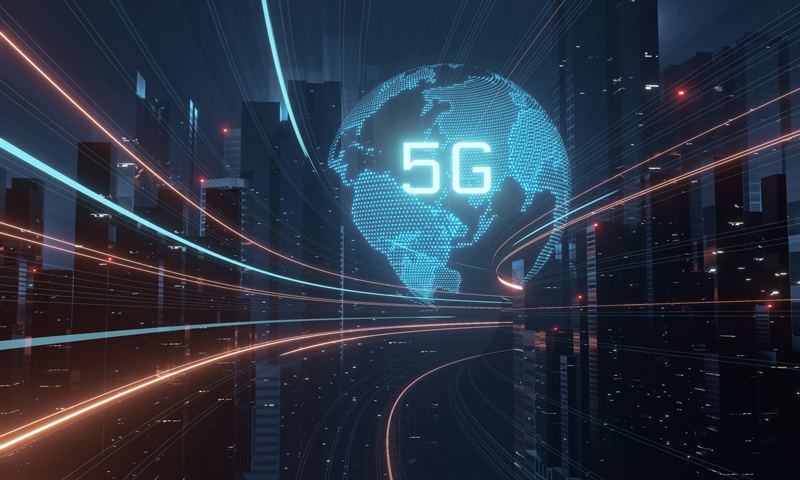Industrial 5G: How It Revolutionizes the Industry?
In today's rapidly evolving technological landscape, the advent of Industry 4.0 has ushered in an era of unparalleled connectivity and automation. At the forefront of this transformative wave is Industrial 5G – a cutting-edge technology poised to revolutionize the manufacturing and industrial sectors. In this blog post, we will delve into the essence of Industrial 5G, the myriad advantages it brings, its diverse applications, and the promising future it holds.
What Is Industrial 5G?
Industrial 5G, often referred to as 5G for Industry or IIoT (Industrial Internet of Things), represents an advanced wireless communication standard meticulously designed to cater to the specialized requirements of industrial applications. Building upon the foundations of 5G technology, it optimizes itself for the demanding needs of manufacturing, automation, and critical infrastructure.
At its core, Industrial 5G facilitates ultra-reliable, low-latency communication between machines, sensors, and control systems, thereby establishing a highly responsive and interconnected industrial ecosystem.

What Are the Advantages of Industrial 5G?
The advantages of 5G technology in an industrial context are manifold, promising transformative benefits:
-
High-Speed Data Transmission: It offers lightning-fast data transmission, allowing businesses to access and transfer data in real time. This speed is crucial for time-sensitive applications and decision-making.
-
Low Latency: The low latency of Industrial 5G ensures that data can be processed almost instantaneously. This is vital for applications where a delay could be costly, such as autonomous machinery and remote control.
-
Reliability: It is designed to be highly reliable, even in challenging industrial environments. This reliability ensures consistent connectivity and minimizes disruptions.
-
Massive Connectivity: It accommodates a multitude of devices concurrently, fostering the growth of the Internet of Things (IoT) and the proliferation of sensor networks.
-
Efficiency and Productivity: Industrial 5G enables process optimization and automation, resulting in increased efficiency and productivity. It helps reduce downtime and errors, leading to cost savings.
-
Safety Improvements: With real-time data transfer, safety protocols can be enhanced. Machines can respond to safety breaches immediately, reducing the risk of accidents and improving workplace safety.
-
Cost Reduction: Predictive maintenance, made possible by Industrial 5G, helps prevent unexpected breakdowns and reduces operating costs. It also extends the lifespan of equipment.
-
Flexibility and Adaptability: Businesses can quickly adapt to changing market conditions and demands. Industrial 5G allows for the dynamic reconfiguration of production lines and processes, ensuring flexibility and agility.
-
Integration with Emerging Technologies: It can seamlessly integrate with emerging technologies like artificial intelligence and machine learning, further enhancing its capabilities and contributing to more intelligent decision-making.
Applications of Industrial 5G
Compared to previous network technologies, 5G technology offers significantly enhanced overall performance. Its extensive implementation on the industrial internet will undoubtedly lead to a stronger integration of modern industry and information networks, accelerating the development of the industrial internet. Here are some specific applications of Industrial 5G in various fields:
Smart Manufacturing
In smart factories, it empowers real-time monitoring and control of machines, enabling seamless automation and efficiency improvements. Industrial switches and industrial Ethernet switches play pivotal roles in ensuring reliable and high-speed data transmission.
Healthcare
Industrial 5G facilitates telemedicine and remote surgery through its low latency and high bandwidth, enabling real-time communication between medical professionals and patients or between surgeons and robotic surgical systems.
Transportation
Industrial 5G is revolutionizing logistics and supply chain management. It allows for real-time tracking of shipments, optimizing routes, and improving overall efficiency. Companies like Amazon use it to track packages, ensuring timely deliveries and minimizing delivery costs.
Agriculture
Precision farming is becoming more accessible with Industrial 5G. Farmers can use autonomous tractors and drones for planting and monitoring crops. These devices can collect data on soil conditions and crop health in real-time, helping farmers make data-driven decisions to maximize yield while conserving resources.
Energy Sector
Utilities and energy companies employ Industrial 5G for monitoring and controlling critical infrastructure, ensuring efficient energy resource distribution. For instance, in a wind farm, sensors on turbines can provide real-time data on performance, allowing for predictive maintenance and reducing downtime.

The Future of Communication Technologies
Industrial 5G represents just the tip of the iceberg in the evolution of communication technologies. As we move forward, we can expect even more exciting developments:
-
6G on the Horizon: While 5G is still in its early stages of deployment, researchers are already looking ahead to 6G. This next-generation network is expected to offer even faster speeds, lower latency, and more advanced capabilities, further transforming industries.
-
Edge Computing Integration: The combination of 5G and edge computing will enable industries to process data closer to the source, reducing latency and enhancing real-time decision-making.
-
HPC and Machine Learning: The integration of 5G with HPC and machine learning will open up new possibilities for predictive maintenance, quality control, and process optimization in industrial settings.
Conclusion
Industrial 5G represents a quantum leap in connectivity within the industrial sector, offering unprecedented reliability, low latency, and high bandwidth. As it continues to evolve, its impact on manufacturing, automation, and beyond will become increasingly evident, ushering in a new era of innovation and efficiency. Embracing this technology is not just an option; it's a necessity for businesses seeking to thrive in the Industry 4.0 landscape. Stay tuned for the exciting developments that lie ahead in the realm of Industrial 5G.
You might be interested in
Email Address

-
PoE vs PoE+ vs PoE++ Switch: How to Choose?
May 30, 2024















